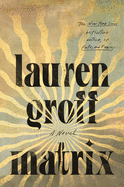
Lauren Groff has built a significant career crafting novels and stories featuring sharp observations by and about modern women. In a surprising feat of time travel, the two-time National Book Award finalist (for Fates and Furies and Florida) leaps back to 12th-century England in Matrix and fictionalizes the life of Marie de France, believed to be the first woman to write poetry in French. Groff finds narrative inspiration in one of Marie's possible identities: Marie, Abbess of Shaftesbury, who was also King Henry II's half-sister. From minimal details, Groff produces a sublime examination of a woman's subversive refusal--almost a millennium ago--to be constrained by what society deemed forbidden.
In 1158, 17-year-old "poor illegitimate Marie from nowhere in Le Maine had at last been made prioress of a royal abbey." Groff's imagined Marie is a "giantess" in accomplishments, who goes on to create a scriptorium filled with literate women; elevates "the daughter of her spirit" as public bailiffess; engineers a labyrinth of secret passages for protection from outsiders; feminizes verbs and nouns in missals and psalters when she can't sleep; and dares to preside over Mass. In an environment of suffocating control under church and crown, Marie--and her "always underestimated" sisters--continuously assert themselves. Groff, like Marie, adapts her language in repeated acts of empowerment. She reclaims her title word from the Latin--mater/matr for mother, -(t)rix for feminizing--and builds her sorority with cantrix, infirmatrix, cellatrix, scrutatrix. Through Groff's glorious imagination, Marie is forever "made great... the holiest of holy women on the island, venerated and beloved." --Terry Hong, Smithsonian BookDragon

